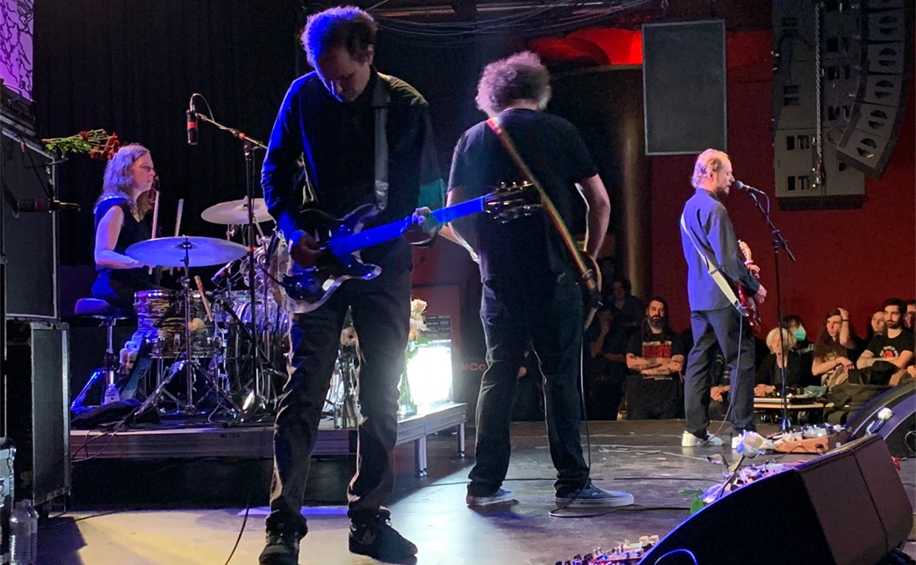Unwound, a noisy ’90s cult band, sits somewhere between indie, angular post-punk, noise, and hardcore music.
Massively influential in underground music, they hail from the pine-scented landscapes of Tumwater, Washington, in the Pacific Northwest. Currently on the road, they are playing their first live shows in over 20 years. I experienced them in concert at The Showbox in Seattle, Washington, on February 4.
Band members include Justin Trosper (guitar/vocals), Sara Lund (drums), and Vern Rumsey (bass). The band is memorializing the passing of Vern in 2020 by carrying on with live performances with Jared Warren (Karp, Melvins, Big Business) on bass. Scott Seckington (Nocturnal Habits) has also been added as a second guitarist on the tour.
Oppositional and DIY Scene Ethics
Most readers have probably never heard of Unwound. The band defiantly maintained creative control with unwavering independence from the mainstream music machinery. This stance kept them out of the spotlight.
Unwound never took the corporate record label money fueled by the Nirvana grunge boom of the early ’90s when any musician in the Seattle, Washington, region utilizing a distortion pedal was quickly scooped up, signed, and spit back out.
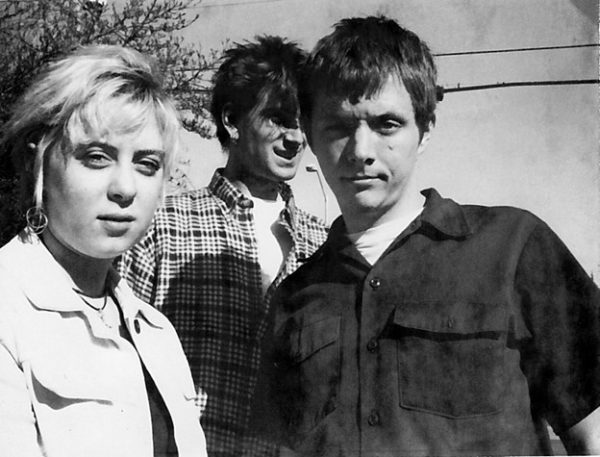
(Photo: Sarah Lund (left), Vern Rumsey (middle) Justin Trosper (right) Source: Unwoundarchive.com)
Their songs were never used in Volkswagen TV spots or cycled into regular rotation on conglomerate-owned alternative rock stations. They avoided the promotional machinery of MTV and Rolling Stone. Much like their post-hardcore contemporaries Fugazi, they existed outside mainstream spectacle and mass commodification.
Unwound cultivated a cult following through relentless touring. They played established underground networks in basement/house shows, legion halls, and college campuses. They survived on the scrappy revenues these all-ages venues provided between 1988-2002 as well as coverage in photo-copied zines, regular play on staticky college radio stations, and physical albums sold at brick-and-mortar independent record stores.
Kill Rock Stars, Resistance, and Creative Control
Unwound was a flagship act on Kill Rock Stars, an anti-corporate independent record label based in Olympia. These alternative media distribution and participatory underground scenes operated in direct opposition to the industrial mass media machinery at the time, an alternative media ecology in practice. The music of Unwound is defiant and challenging as a result of this independence from corporate models. The lyrics often criticize alienation.
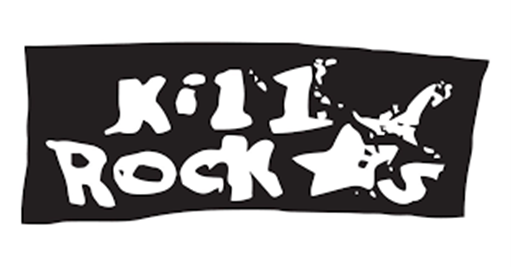
The sound of Unwound is difficult to pin down. It combines traces of Sonic Youth with their New York no-wave influence Glenn Branca. Unwound is similar to D.C. post-hardcore auteurs Fugazi (they toured together in 1995), but not as obscure as Polvo or Bitch Magnet. The music references underground heavyweights Shellac, Slint, and the slow-core builds of the dreamy Bedhead and Mogwai later in their career. Unwound influenced Modest Mouse, Blonde Redhead, and many others.
The relentless profit motives of major labels smoothed over the rough edges of many underground acts snatched up during the Nirvana gold-rush, rendering them more accessible to a mass audience. Unwound adopted a different approach. It doubled down on playful experimentation to incorporate instrumental elements, drones, and reverb effects over repetitive bass lines; a not-so-sunny take on Jamaican dub music.
The indie label Kill Rock Stars afforded Unwound creative license to push boundaries rather than to create a sound to appeal to a larger market. Unwound’s resistance to mass culture fuels their appeal and honorable DIY ethics. The borders between independent and corporate-produced music provided clarity in the 1990s. That no longer exists today. As a result, Unwound’s musical styles and approaches to producing albums must be seen as act of resistance.
Reunion Show as a Subcultural Event
Unwound hasn’t performed live in over two decades. So the February 4 show was a significant event. They only perform in larger markets such as New York, Chicago, and San Francisco on this tour. While I was doing research for this piece, an internet search of older concert reviews yielded almost no information, adding to the band’s mystique and underscoring their rise to fame in the early days of the internet. I find this obscurity compelling.
The February 4 show was my first time to see Unwound perform.
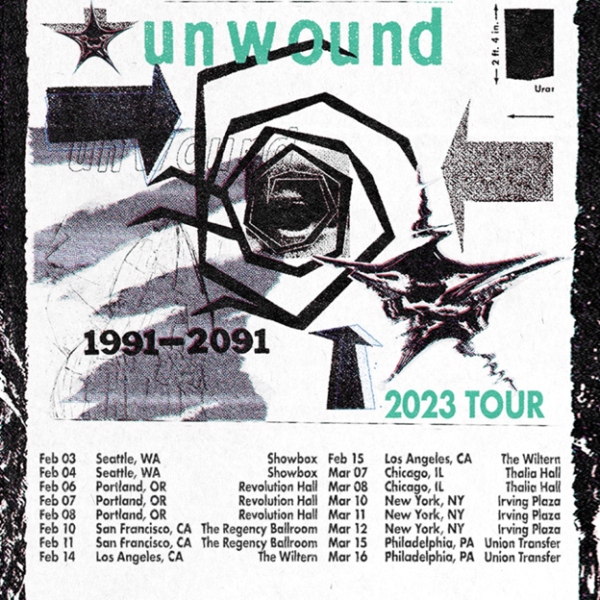
The subcultural significance of this show spurred me to travel across Washington State, crossing treacherous winter mountain passes on a grimy Greyhound bus because flights were too expensive. Revisiting their back catalogue via streaming while traversing desolate landscapes and the corporate monoculture of rest-stops, the arid rocky central Washington landscapes provided a visual track for a disjointed and bleak soundtrack. Where I was staying in Seattle, I encountered other fans who had traveled down from Canada, excitedly reminiscing about seeing Unwound back in the exuberant indie heyday of the 1990s.
Making Space: The Showbox
The trademark chilly evening Seattle drizzle fell upon a line of middle-aged scenesters with greying beards dressed in black outside the venue. Tourists mingled around the adjacent Pike Place Market. One couple barely avoided a random puddle of vomit on the sidewalk. The unhoused slept in dimly lit entranceways to corporate businesses.
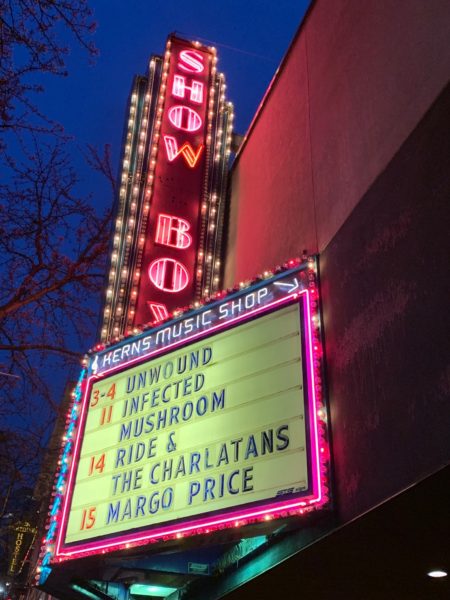
(The Showbox in Seattle, Washington. Smartphone photo by David Gracon)
In existence since 1939, The Showbox was almost lost to gentrification and high-rise housing. The community fought to preserve it and eventually secured historic building status in 2019. The venue is a key signifier of the obscured history of Seattle jazz scenes. It has featured everyone from Duke Ellington to a who’s who of iconic grunge bands.
The Showbox exemplifies cultural resistance, especially in a city with a downtown core dotted with impersonal and towering glass buildings. It is a space of urban and historical reclamation, fitting for a band like Unwound.
The Show: Start a Fire for Something New
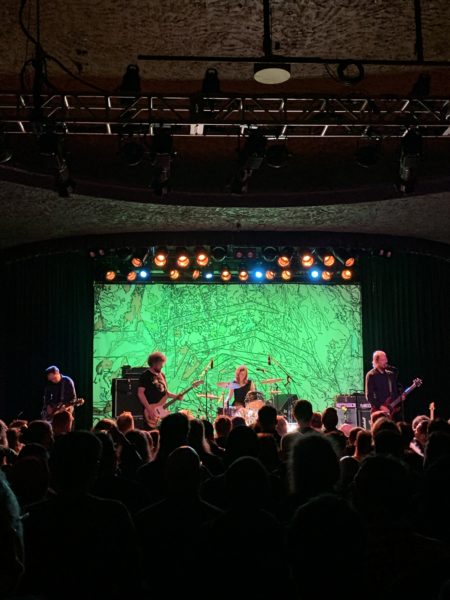
(Unwound at the Showbox in Seattle, Washington. Smartphone photo by David Gracon)
Reunion tours can be both a gamble and a mess, especially when confronted with a two-decade-plus gap in live performance. Unwound did not disappoint in their two 40-minute sets.
Unwound charged with complex rhythm changes. Sara Lund’s hypnotic and meticulous drumming abilities held it all together. Guitarist/vocalist Justin Trosper led with dark, odd tunings and distorted bursts and screams. His style evokes math rock and post-hardcore music that produces a groove that then changes abruptly.
Their set pulled from their seven full-length albums. They performed half of the album “Repetition” (1996). The closest thing to a hit was “Corpse Pose” channeling the anomie of Black Flag punk and emo culture:
“The drawback to living is finding yourself
Watch your heart, let it bleed, don’t have faith in anything.”
Unwound songs critique mass culture homogenization, conformity, the banality of consumer culture, technology, and media systems as social control. Singing “For Your Entertainment,” Trosper satirically exclaimed:
“Follow any trend that comes their way
They will pick your life apart
And throw away your art
Finding something new is never hard.”
Followed by the cathartic screaming of every syllable of:
“Entertainment!
Entertainment!”
They dug into their underappreciated album, “Challenge for A Civilized Society” (1998), with “Laugh Track,” a song resonating today with the relentless pressure to participate in vapid unpaid fan labor and constant self-branding as entertainment on social media platforms:
“Laugh track inside my head/running out of jokes for the audience/running out of jokes.”
At one point Sarah jokingly noted that the mosh pits were much more intense 20 years ago. The audience closest to the stage responded with a frenzy of dancing.
In “New Energy,” another ripping and pummeling track creates an anthem. Trosper exclaims:
“Where’s your energy?/There’s no energy!”
“State your age, set the stage, start a fire for something new.”
An emotional performance for the band, they honored the late Vern. The band wrapped up their set and tossed flowers into the welcoming crowd.
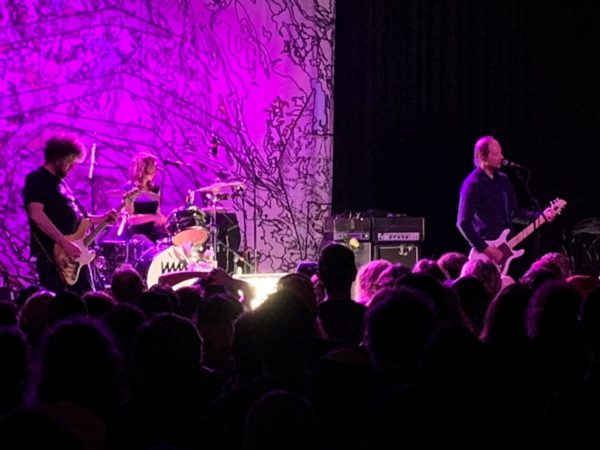
(Unwound at the Showbox in Seattle, Washington. Smartphone photo by David Gracon)
Independence and Control
This show presented an opportunity to witness one of the greatest underground DIY acts in the history of the American Pacific Northwest.
It vividly underscored the importance of making your own independent cultural spaces and art with integrity, freedom, control, and others.
As I left The Showbox and ambled through the dark Seattle streets, a white and blue misty glow obscured the high rise buildings. I realized I had just witnessed musical history.
David Gracon is an assistant professor of Integrated Media at Gonzaga University located in Spokane, Washington. His research/teaching interests include media literacy, alternative media, and the political economy of communication. His film/video works have screened at the Chicago Underground Film Festival, and over fifty others. In 2017/2018 he was a U.S. Fulbright Scholar teaching media studies at Precarpathian National University in Ivano-Frankivsk, Ukraine. He has been a part of DIY media scenes, zines, underground music, alternative film and video communities since 1997.

